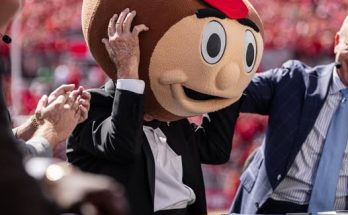The start of every college football season carries with it anticipation, speculation, and a certain degree of uncertainty. But there are some games that stand out on the calendar months before kickoff, games that command the attention of fans, coaches, scouts, and the media alike. In 2025, there is no bigger opening-week showdown than Texas versus Ohio State, a clash that not only pits two top-five teams against each other but also places the brightest spotlight yet on Arch Manning, the Texas Longhorns’ quarterback who has been at the center of the college football conversation since his high school days. For Manning, this game is more than just another contest—it represents his defining moment, a chance to cement himself as the leader of a program with championship aspirations and to prove he belongs among the elite quarterbacks who have carried their teams under the heaviest of spotlights.
The storyline of Arch Manning has always been about legacy and expectation. Born into the most famous football family in America, he is the grandson of Archie Manning and the nephew of Peyton and Eli Manning. From the time he was a teenager at Isidore Newman School in New Orleans, every throw he made was scrutinized, every performance dissected, and every decision debated by fans and pundits. When he chose Texas over traditional powers like Alabama and Georgia, it was seen not only as a commitment to the Longhorns but also as a statement that he wanted to forge his own path. Since then, his career in Austin has been marked by progress, promise, and at times, growing pains. But now, entering the 2025 season, Manning stands as the unquestioned leader of a Texas team ranked number one in the country, tasked with proving that both he and the program are ready to challenge the nation’s best on the grandest stages.
And few stages are bigger than a primetime showdown with Ohio State in Columbus. The Buckeyes are ranked third in the preseason, boasting one of the most talented rosters in the country. Their defense, long a source of pride for the program, is filled with future NFL stars, particularly in the secondary and along the defensive line. The Horseshoe will be packed with over 100,000 scarlet-clad fans eager to rattle the visiting Longhorns. For Manning, this environment represents the ultimate test of poise and performance, one that will define how he is remembered long after this season. A strong showing could elevate him into Heisman Trophy contention and solidify his place as one of the top quarterbacks in the nation. A poor performance, however, would provide critics with ammunition to question whether he has lived up to the family name and the enormous hype that has followed him since high school.
The significance of this matchup extends beyond Manning himself. Texas football has been on a long, arduous climb back to national relevance. Once a perennial powerhouse, the Longhorns spent much of the past decade struggling to regain their footing, enduring coaching changes and inconsistency. The arrival of Steve Sarkisian brought renewed energy and a more dynamic offensive system, and in recent years, the Longhorns have begun to reassert themselves on the national stage. Last season’s strong finish and recruiting success placed them back among the elite programs, but now comes the moment of truth. A victory against Ohio State would send a clear message that Texas is not only back but also ready to contend for a national championship. A loss, while not necessarily fatal, would fuel doubts about whether the program is truly ready to compete with the nation’s best on the road in a hostile environment.
For Ohio State, the stakes are equally high. The Buckeyes, under head coach Ryan Day, have been perennial contenders, but recent seasons have been defined by close calls and bitter disappointments, particularly against archrival Michigan. Their fans demand nothing less than dominance, and opening the season with a statement win over the top-ranked team in the country would silence critics and reignite their championship hopes. Their defense, designed to pressure quarterbacks and force mistakes, is tailor-made to test Manning’s decision-making and composure. The battle between Manning and Ohio State’s defensive front will likely determine the outcome of the game. If he can handle the pressure, extend plays, and find his talented group of receivers, Texas will have a chance to silence the crowd. If he falters, the Buckeyes will pounce, turning mistakes into points and seizing momentum.
What makes this moment so defining for Arch Manning is not just the magnitude of the opponent but also the narrative that has followed him throughout his career. Despite his talent, he has always been compared to his uncles and grandfather. Peyton was the cerebral field general who revolutionized the quarterback position in the NFL. Eli was the clutch performer who delivered two Super Bowl victories over Tom Brady’s Patriots. Archie, though burdened by poor teams in New Orleans, remains a beloved figure and symbol of perseverance. Arch carries all of this on his shoulders, and fair or not, every performance he delivers is measured against this standard. For many fans, beating Ohio State under the lights would be the kind of signature win that separates hype from reality.
The pressure on Manning will be immense, but so too will be the opportunity. College football is built on moments—those nights when a player rises above the noise and delivers a performance that becomes legend. Vince Young’s run in the Rose Bowl, Cam Newton’s comeback at Alabama, Joe Burrow’s dominance at LSU—all of these players had defining games that elevated them from talented quarterbacks to icons. For Manning, Ohio State presents that very chance. A victory in Columbus would not only solidify Texas’s number-one ranking but also thrust him into the national spotlight in a way that would be impossible to ignore. Every highlight reel, every discussion about the Heisman, every debate about the best quarterbacks in the country would feature his name.
It is worth noting that Manning does not face this challenge alone. Texas brings one of the most complete rosters in college football into the matchup. The offensive line, long a weakness in Austin, is now a strength, anchored by future NFL talent. The running game is potent, capable of relieving pressure on Manning and controlling the tempo. The receiving corps is among the deepest in the nation, providing him with multiple weapons to exploit mismatches against even the most talented defenses. Defensively, Texas has improved dramatically, boasting a front seven that can disrupt Ohio State’s running game and pressure their quarterback. For Manning, this means that he does not have to be perfect—he simply has to lead, to execute, and to make the kind of plays that separate good quarterbacks from great ones when the game hangs in the balance.
Of course, defining moments are not only about performance but also about resilience. It is almost certain that Manning will face adversity in Columbus. Perhaps he will throw an interception, or perhaps Ohio State will seize an early lead, feeding off the energy of the crowd. The true measure of greatness is not avoiding mistakes but responding to them. Peyton Manning threw countless interceptions early in his career before becoming one of the greatest quarterbacks of all time. Eli was often criticized for inconsistency before delivering in the biggest games. Arch will have his chance to demonstrate that same resilience, to show that he can shake off setbacks and rally his team when the odds seem stacked against them.
For fans, the anticipation of this showdown has been building for months. The television networks will hype it as the game of the week, perhaps even the game of the season. Every highlight package will feature slow-motion clips of Manning warming up, the crowd roaring, and the two teams colliding at the line of scrimmage. For Texas fans, the hope is that this will be the night their program announces to the world that it is truly back. For Ohio State fans, the expectation is that their team will protect its home turf and send a message that the road to the national championship still runs through Columbus. For neutral fans, it is simply the kind of marquee matchup that makes college football so special—a game filled with talent, tradition, and stakes that feel almost like a playoff contest in week one.
In the end, Arch Manning’s defining moment may not be measured solely by statistics. He could throw for 300 yards and three touchdowns, or he could struggle and rely on his teammates to carry the load. What will matter most is how he responds to the moment—how he leads his team, how he carries himself under pressure, and how he performs when the lights are brightest. For some players, the weight of expectation can be too heavy. For others, it is fuel, driving them to heights they could never otherwise reach.
As kickoff approaches, one thing is certain: the eyes of the college football world will be fixed on Columbus, on the Horseshoe, and on Arch Manning. His defining moment has arrived, and how he responds will shape not only the 2025 season but also the legacy of a young man carrying the most famous name in football. For Texas, for Manning, and for the sport itself, this is the kind of showdown that reminds us why we love college football—the drama, the intensity, and the chance to witness greatness in real time.



